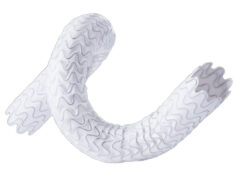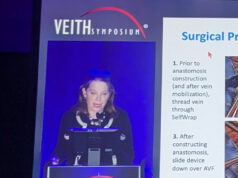
The Vascular Annual Meeting 2023 (14–17 June, National Harbor, USA) recently featured the presentation of new data on an external support device that may deliver more functional arteriovenous fistulas (AVFs) while also offering an improvement in cost-effectiveness. Presenting an abstract on research into the VasQ device was Ellen D Dillavou (WakeMed Hospital, Raleigh, USA).
The study explored the support device’s ability to improve functional success in AVF over a 24-month period. Dillavou delivered “the first complete report of the US pivotal comparative study results”, alongside a cost-effectiveness analysis. Over the study, she detailed, 144 patients were enrolled—90% of them receiving a brachiocephalic and 10% a radiocephalic fistula.
Some 782 patients treated by the same surgeons without the VasQ device immediately before enrolment in the trial were identified as a comparative group, with their Medicare claims data utilised for comparison. Statistical comparison was then performed between the groups with regards to primary patency—defined as freedom from intervention—as well as functional success (continuous use for dialysis after 30 days) and post-creation reintervention. Healthcare payor cost was taken into consideration alongside each of these outcomes.
“Primary failure of 7.9% for VasQ AVF patients compared favourably to the 22% to 32.2% reported in contemporary U.S. meta-analyses,” the study authors report, while the cumulative patency for the VasQ device of 76.7% (95% confidence interval [CI]: 67.7–83.4%) was found to be “superior to contemporary meta-analyses,” which the authors say report between 53.7% to 63% for standard AVFs. There was a “nearly 50% reduction in access interventions” with the device at six months, which the authors argue led to the annualised cost reduction they found of US$7,764.19 per patient year.











